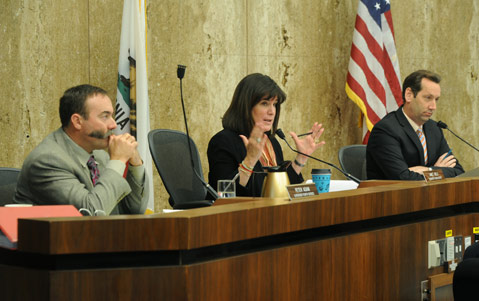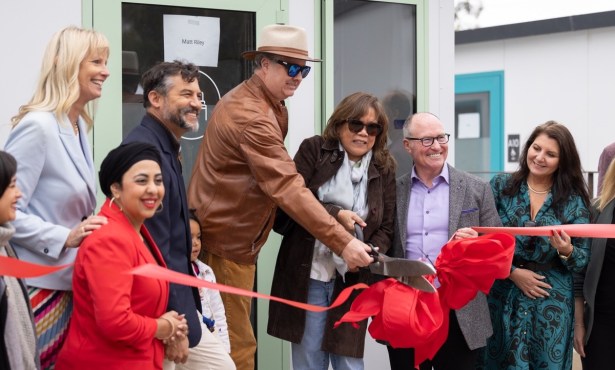Oil Tax Dries Up
Supes Vote to Shelve Divisive Proposal, Say They Need More Time, Input

If a special Board of Supervisors hearing in December was any indication, it seemed likely that county voters would be asked to approve an oil-extraction tax on their June ballots. But where that meeting went one way, Tuesday’s went the other. In a surprise move — as evidenced by the reactions of many oil-industry representatives who showed up to oppose the suggested tax — Supervisors Salud Carbajal, Janet Wolf, and Doreen Farr, who all voted to put the ballot measure’s wheels in motion in December, reversed course and sided with colleagues Peter Adam and Steve Lavagnino to shelve the tax.
“I think the issue before us is a very important issue,” said Carbajal, citing a recent Grand Jury report that advocated placing such a tax on the ballot. “I think we would be wise to give consideration to it in the future at some point; but I think for the time being, I have given some reconsideration to moving forward.”
The proposed tax — which, if approved by voters, would have imposed a $1-per-barrel fee on certain on- and offshore oil producers operating within unincorporated regions of the county and within three miles of shore — would have generated around $3 million a year. As decided by Carbajal, Wolf, and Farr in December, that revenue was to be divided among county libraries, parks, and fire operations.
But being poor in key support, rich in opposition, and crunched for time, the measure quickly found itself fighting against the tide. A so-called special tax, the measure only required a 3-2 vote from the board to make it to the ballot — a vote that split on North-South county lines in December — but required 66 percent approval from voters. From the start, oil-industry officials vowed to fight the tax, and environmental groups expressed serious skepticism. Linda Krop of the Environmental Defense Center (EDC), for example, worried that the prospect of extra revenue would motivate county planning agencies to approve new oil projects. Krop said this week that the EDC was fine with the tax being put to the side.
Adam and Lavagnino had been against the tax from the start and expressed mild surprise about their coworkers’ change of heart Tuesday. After a tax-opposed public speaker quoted President Abraham Lincoln’s second inaugural address — “with malice for none, with charity for all” — to illustrate his point, Adam paraphrased some lines from Dr. Seuss’s Green Eggs and Ham to voice his satisfaction with the tax’s shelving: “Not in a house, not with a mouse; not in a box, not with a fox.” Referencing one of the would-be tax’s beneficiaries, Lavagnino quipped, “Maybe we should have money for libraries.”
Farr said after the meeting that she had been “prepared to go forward” with putting the initiative on the ballot, but explained the support wasn’t there and the timing wasn’t right. “I always hate to miss opportunities to try to increase revenue,” she said, citing the needs of the libraries, parks, and fire department. “The need is great in all these areas.”
Carbajal and Wolf both said that more community input was needed, with Wolf noting after the meeting that a workshop on the tax could be helpful. Wolf said that there were “too many unanswered questions” to pull the trigger, including the issues of which county agency would oversee appeals and the legality of the offshore-oil provision. “I think we should look at this in the future. It needs further discussion,” she said.
Goleta City Councilmember Roger Aceves, who is challenging Wolf in June for her 2nd District seat, said that he was “surprised” by Tuesday’s vote but “really happy that they are not spending any more taxpayer dollars on a process without getting public input,” suggesting that polling be done, as proposed by Wolf the last time an oil-extraction tax came before the board, and went nowhere, in 2012. “Any issue where you’re talking about charging a tax, you need to have it fully vetted with the public,” Aceves said. (The City of Goleta last week received some flak for its public-opinion poll on the city’s tax-sharing deal with the county, a poll that also asked people to rate Wolf.)
If the tax had moved forward and been approved by voters, it would have been the first countywide tax in California. A statewide tax doesn’t exist — Proposition 87 was defeated in 2006 — but a new extraction tax was recently proposed for the November ballot. County staff said that the oil tax could potentially be held for the November election — which Farr expressed some interest in — but that a decision would have to be made by July.
While the oil tax sank on Tuesday, the proposal to increase the county’s hotel bed tax floated back to the surface. Currently, the bed tax charged in unincorporated regions is 10 percent, despite every city in the county imposing a 12 percent tax. Unofficial talks of possibly putting that issue on the November ballot earned support from public commenters, Aceves, and the supervisors.


